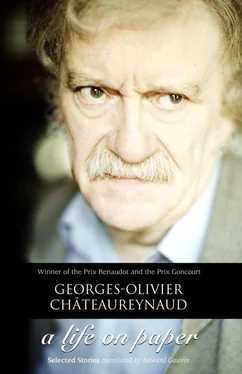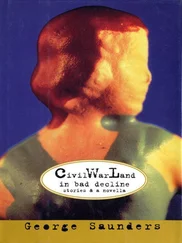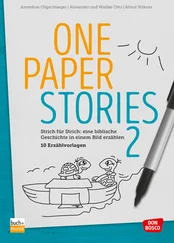Georges-Olivier Chateaureynaud - A Life on Paper - Stories
Здесь есть возможность читать онлайн «Georges-Olivier Chateaureynaud - A Life on Paper - Stories» весь текст электронной книги совершенно бесплатно (целиком полную версию без сокращений). В некоторых случаях можно слушать аудио, скачать через торрент в формате fb2 и присутствует краткое содержание. Год выпуска: 2010, Жанр: Современная проза, на английском языке. Описание произведения, (предисловие) а так же отзывы посетителей доступны на портале библиотеки ЛибКат.
- Название:A Life on Paper: Stories
- Автор:
- Жанр:
- Год:2010
- ISBN:нет данных
- Рейтинг книги:4 / 5. Голосов: 1
-
Избранное:Добавить в избранное
- Отзывы:
-
Ваша оценка:
- 80
- 1
- 2
- 3
- 4
- 5
A Life on Paper: Stories: краткое содержание, описание и аннотация
Предлагаем к чтению аннотацию, описание, краткое содержание или предисловие (зависит от того, что написал сам автор книги «A Life on Paper: Stories»). Если вы не нашли необходимую информацию о книге — напишите в комментариях, мы постараемся отыскать её.
A Life on Paper
A Life on Paper: Stories — читать онлайн бесплатно полную книгу (весь текст) целиком
Ниже представлен текст книги, разбитый по страницам. Система сохранения места последней прочитанной страницы, позволяет с удобством читать онлайн бесплатно книгу «A Life on Paper: Stories», без необходимости каждый раз заново искать на чём Вы остановились. Поставьте закладку, и сможете в любой момент перейти на страницу, на которой закончили чтение.
Интервал:
Закладка:
All this led us to a vacation. I didn't usually take one. I hate beaches and sunburn. Delia didn't see it that way. She wanted to go to the shore with me. I surrendered on one condition, and remained firm about it: Gaud was going with us. Leaving her alone for a month was out of the question; you couldn't ask the super to look after a mummy the way you would a canary. In truth, I'd long planned to take Gaud back to the Brittany of her childhood. The name of the little fishing village where she'd been born floated to her lips like a cork plucked from a net and tossed ashore by waves. I kept the idea of the pilgrimage to myself. I made sure Gaud knew nothing about it. And as for Delia, who'd reluctantly given in to being burdened with her rival-it was pointless to tell her.
We left one morning in July, in Delia's car. She was at the wheel, with me beside her, and Gaud in the backseat, in her case. Delia didn't say a word the whole way. She'd given in. The vacation she'd dreamed of for so long was ruined in advance. She was determined to make me pay dearly. There was nothing but rain and wind en route.
I'd rented a house in the back country, a few kilometers from the village where Gaud was born. The wet summer made me dig deep into the woodshed. I kept a fire crackling in the hearth in the main room. Unable to swim or sunbathe, Delia was always going out for walks through the waterlogged moors. Never one for slogging through mud, I staved and worked by the fire. Delia would come back with her nose dripping, smelling of moist earth and the heath. If I offered to warm her up as only I could, she'd turn me down and glare at the case leaning against the wall, across from the bed.
One morning neither more nor less disastrous than the others, I put my plan into action. I'd seen Delia head off in the opposite direction from the village. I carried Gaud's case to the car. Since our arrival the mummy had only stirred from her torpor twice, and quite briefly. I was guessing she had no idea where we were.
A little ways from the village, I turned down a dirt road leading to the sea. The nonstop drizzle had discouraged most visitors. The rare figure stuffed into a jacket, bright yellow or fluorescent pink against the seaweed, punctuated the shore and the exposed rocks.
I parked at the edge of the dunes and got the case from the car. I'd never woken Gaud before. I opened the lid and whispered, "Gaud! Gaud! Wake up! Look where we are."
Her eyes were always open, even when she was asleep. Her nose and lips quivered, telling me she was awake. When she saw the sky and felt the drizzle on her cheeks, she knew, even before she'd climbed out of her shell and looked around.
"You brought me back?"
"Yes. I thought-" In heaven's name, what exactly had I thought?
"Help me."
I obeyed. She crawled from the case and stood up on her wobbly legs.
"Hold me up."
In my study, she'd never taken more than a few steps before, leaning on my arm.
Despite the dull gray sky, it was still too bright out for her. She held one hand up to shield the masterpiece of Leonello Guardicci.
"It was over there!"
With her free hand, she pointed at the slate roofs and the slanting, motionless masts of boats on the beach. Over there, under one of those roofs, she'd had a life, or a childhood, at least. Voices, smells, emotions connected her to one of those houses by a thread perhaps indestructible, or perhaps ready to be severed at last, this time for good.
"Do you want to go down there?"
"No. I know there are people I loved down there, but… I no longer know who they are. It's better that way. Walking, feeling the rain and wind on my face-this is enough. Help me."
She weighed nothing. Her feet barely left prints in the wet sand. We covered about fifty yards. At one point I loosened my grip on her arm for a second, and I thought the wind was about to blow her away.
"That's enough," she murmured. "That's good. Take me back. Please."
We turned around. She curled back into the case. I put it in the car, and we went back to the house.
During lunch, Delia insisted I accompany her that afternoon. She wanted to show me a cross she'd found by the wayside. Delia was interested in crosses, medieval wash houses, ancient sheep barns… As though there were something to see in the world. She implied that if I agreed to go out and catch a cold with her, she'd be grateful.
She'd hung her raincoat by the door. I'd gulped down my coffee and, as we were about to head out, went up to the bedroom to find mine. I took the chance to check in on Gaud. She gave me one of those pitiful smiles that moved me so much.
"Nothing can hurt me, you know, but that walk we took did me good," she whispered, as I was worried about how tired she seemed.
"Rest up," I said.
"Yes… Leave the lid open a little, please. Sometimes I feel like I'm suffocating."
I studied her suspiciously.
"Please! I won't do anything stupid. No more pranks."
Did I believe her? I gave in to her request. When we got back from our walk, Delia and I found her almost completely consumed in the hearth. All that remained was a trace, in relief, of her body curled up on a bed of embers. I wanted to recover the eyes that divine glassmaker had given her, but I didn't have the heart. Delia took the poker from my hands. Digging through the embers, she found only two shapeless drops of glass she gave up on saving. She picked up a shovel instead and patted the reddish burial mound flat.
Later, back in Paris, I remembered what the taxidermist had said when he gave me the certificate of authenticity. "Fire, theft, nothing's safe. These days, everything disappears or goes up in smoke. Make sure you're insured!" I'd followed his advice. Now I called in the insurance. I was reimbursed for Gaud in cash, and with that cash I bought our wedding rings: Delia's and my own.
Lozere, Sept.-Oct. 1995
Ecorcheville

 hen Orne heard that several automated firing squads had been set up around town, he was unimpressed. Of all the innovations constantly being introduced to the surroundings, how mane turned out to last? Of course certain amenities, like phone or photo booths, had established themselves by proving their usefulness. But how would the use of an automatic firing squad-one that you used yourself-ever catch on? Once the novelty had worn off, such an invention was doomed never to be more than a gimmick. Besides, from just what point would such contraptions break even and ensure returns? How many shootings would it take per month to pay the upkeep alone? Even though it was all in theory automatic and self-cleaning, someone had to pay workers to remove the bodies and gunsmiths to regulate and reload the weaponry. Orne had trouble seeing how an entrepreneur might make back his investment, cover his costs, and show any profit.
hen Orne heard that several automated firing squads had been set up around town, he was unimpressed. Of all the innovations constantly being introduced to the surroundings, how mane turned out to last? Of course certain amenities, like phone or photo booths, had established themselves by proving their usefulness. But how would the use of an automatic firing squad-one that you used yourself-ever catch on? Once the novelty had worn off, such an invention was doomed never to be more than a gimmick. Besides, from just what point would such contraptions break even and ensure returns? How many shootings would it take per month to pay the upkeep alone? Even though it was all in theory automatic and self-cleaning, someone had to pay workers to remove the bodies and gunsmiths to regulate and reload the weaponry. Orne had trouble seeing how an entrepreneur might make back his investment, cover his costs, and show any profit.
Orne's predictions, pronounced on the terrace of the Cafe du Centre, in no way surprised his listeners. He was a known disbeliever and belittler. Not a bad sort, though, all things considered. The absence of any unforgivable defect in his personality, aside from a tendency to criticize, brought him, on the part of his acquaintances, a measured attachment more lukewarm than loving, but real. In his circle his skepticism was credited to his frustration. He was a man lucky neither in leisure nor love. Leisure-well, that was a manner of speaking. Orne never relaxed: he worked. And despite the lengths to which he went, his business languished. His glove shop had never managed to attract the refined clientele of his dreams. The dandies and damsels of Ecorcheville were faithful to Damien Letoile, perhaps because his competitor came from the class of which they themselves were part. Damien hailed from the very heart of one of Ecorcheville's oldest families, whose prosperity, born of the slave trade, had been further consolidated by the importation of poppies at a time when opium was sold by the seed at every apothecary's. In this gloved, hatted, and cravatted milieu, Damien was related to everyone. The men greeted him with a "Hallo, old sport;" and the women kissed both his cheeks upon entering his boutique. From a much more modest background, Orne did his best to sell gloves and ties to those whose parents had lived bare-handed, with unbuttoned collars, like his own. This accounted for fully half his bitterness.
Читать дальшеИнтервал:
Закладка:
Похожие книги на «A Life on Paper: Stories»
Представляем Вашему вниманию похожие книги на «A Life on Paper: Stories» списком для выбора. Мы отобрали схожую по названию и смыслу литературу в надежде предоставить читателям больше вариантов отыскать новые, интересные, ещё непрочитанные произведения.
Обсуждение, отзывы о книге «A Life on Paper: Stories» и просто собственные мнения читателей. Оставьте ваши комментарии, напишите, что Вы думаете о произведении, его смысле или главных героях. Укажите что конкретно понравилось, а что нет, и почему Вы так считаете.












